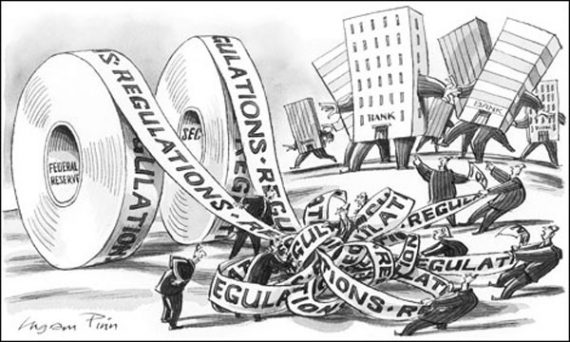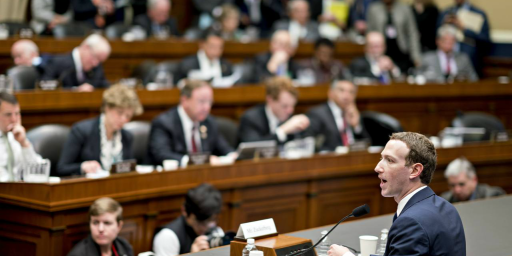Should Lawmaking Be Left to Congress?
Should the Legislature take back legislating from the Executive?
Dave Schuler points me to George Will‘s endorsement of something called the REINS Act as one of “six measures concerning practical governance and constitutional equilibrium” Republicans should pass once the take over both Houses of Congress in January. Leaving aside questions of whether 54 or 55 Republican Senators will actually be able to pass legislation in a system that now requires a 60 vote supermajority for virtually everything, the Act seems reasonable enough on its face. As described by Will:
Pass the Regulations from the Executive in Need of Scrutiny (REINS) Act. It would require that any regulation with at least a $100 million annual impact on the economy — there are approximately 200 of them in the pipeline — be approved without amendments by a joint resolution of Congress and signed by the president. “In effect,” writes the Hudson Institute’s Christopher DeMuth, “major agency rules would become legislative proposals with fast-track privileges.” By requiring legislative complicity in especially heavy federal burdens, REINS is an ingredient in the recipe for resuscitating Congress, which has been far too eager to cede legislative responsibilities to the executive branch.
Like Dave, I was heretofore unfamiliar with this bill. But The Hill reports that the House passed it in August of 2013 and, in fact, was “the latest incarnation of legislation that has been introduced in each of the last three Congresses.” They also report that the Obama White House has threatened to veto the bill were it to pass.
As the economy has gotten more complicated and the scope of government has grown, Congress has effectively ceded the vast majority of the authorities enumerated to it in Article I of the Constitution to extra-constitutional regulatory agencies in the Executive Branch. Theoretically, Congress still passes laws outlining broad policies with the experts in the agencies simply fine-tuning the execution of the laws; in reality, we’ve reversed the polarity of lawmaking, with the Executive serving as a quasi-legislative branch and the Legislature wielding a veto power through the oversight process.
James Gattuso, a senior fellow in regulatory policy for the conservative Heritage Foundation, extolled the bill three years ago.
REINS would significantly change the way regulations are imposed. Congress would no longer be able to pass hazy legislation and disclaim further responsibility. By increasing Congress’s accountability for regulatory policy, it would end the shell game for responsibility that Members have long played. Requiring explicit congressional approval for new rules is no panacea for excessive regulation, but it is a common-sense step forward.
Firm action by Congress to rein in costly regulation is sorely needed. Over the past few years, the cost and number of new regulations have increased dramatically. This increase did not begin with President Obama, but it has accelerated markedly during his tenure. From inauguration day 2009 through March of this year, regulatory agencies imposed some 75 major new regulations (defined as those costing $100 million or more), imposing some $38 billion of new costs annually on the economy and consumers.[1]
This is on top of the continuing burden of the existing stock of red tape, which has been estimated at some $1.75 trillion per year.[2] This burden not only increases costs for consumers but hinders enterprises from growing and jobs from being created.
Let’s stipulate that Heritage is anti-regulation and that the figures are hotly disputed. But his explanation for why REINS is needed makes sense”
Of course, Congress has always had the constitutional authority to control the growth and reach of federal regulations. The thousands of rules and regulations adopted each year originate from the powers delegated through legislation to agencies by Congress itself. These rules can always be revoked or modified by subsequent legislation passed by Congress and signed into law by the President. And Congress has used this power in the past in particularly egregious cases.
The process is a cumbersome one, however. In an attempt to make it easier for the legislative branch to exercise its authority over regulatory policy, Congress in 1996 enacted the Congressional Review Act (CRA). This act created expedited or “fast-track” procedures for voiding proposed rules, ensuring an up-or-down vote in the House and the Senate on “resolutions of disapproval.”
The CRA, however, has been successfully used only once to stop a rule, and that was a decade ago, when a Labor Department rule promulgated by the Clinton Administration was rejected shortly after President George W. Bush was inaugurated. A major problem is that a CRA resolution—like all other legislation—must be signed by the President, and few Presidents are keen on reversing the work of their own appointees. Knowing how hard it is to obtain a President’s signature to reverse his own regulators, Members of Congress are reluctant to even attempt to reverse a rule under the CRA.
A deeper problem is that many Members of Congress are reluctant to accept responsibility over rulemaking. Under present practices, they get to take credit for enacting popular but vague legislation, but then can plausibly deny responsibility for the specific regulations that follow. The result is power without accountability—a useful result politically but an abysmal one for policymaking.
The REINS Act would end this game by requiring every major rule (those with an economic effect of $100 million or more annually) to be specifically approved by the House and Senate (as well as the President)before the rule takes effect. This would help ensure not only that regulators are exercising their delegated powers in a way consistent with the intent of Congress but that Congress itself can be held accountable for the regulations and consequences of that result.
Kristina Costa of the Center for American Progress offers the liberal retort. It’s not a strong one:
REINS would turn a regulatory process currently driven by scientific expertise, industry input, and careful cost-benefit analysis into a political circus. While agencies are not immune from political influence, they must have legal justifications for the rules they promulgate, and those justifications must stand up in a court of law when challenged. But under REINS, either chamber of Congress—or even a single senator—could effectively overturn a law by refusing to approve critical rules of implementation for entirely political reasons.
She overstates the case there, at least in terms of the most recent version of the bill. Whatever the 2011 version said, the 2013 iteration required an up-or-down vote; this wouldn’t be subject to a hold or filibuster in the Senate. That a majority vote in either chamber could kill costly regulation is a feature, not a bug. That politics would trump “scientific expertise, industry input, and careful cost-benefit analysis” may well be the outcome of this bill going into law; but that’s democracy for you.
Costa continues:
The REINS Act would undermine the system of checks and balances essential to our shared democracy. Under REINS not only would a law need to first pass both chambers of Congress and be signed into law by the president, but any major rules designed to implement that law would need to be approved by both chambers as well. That means that one chamber could effectively overturn a law by refusing to grant approval to essential rules of implementation. In this way, the REINS Act constitutes a radical and unprecedented move away from democratic governance.
But that doesn’t make sense. Congress may very well want to achieve some vague outcome—clean air or preservation of animal habitats, say—but oppose some particular implementation conceived of by regulators. For that matter, since most legislation doesn’t sunset, an act passed during a very different political consensus could spawn regulations years or even decades later. Why shouldn’t Congress get to have a say on that again?
Costa’s most obvious counterargument:
Congress doesn’t have the expertise to evaluate the implementation of every bill it passes
Writing regulations requires detailed technical, economic, and legal knowledge. Whether a regulation is enacted or not shouldn’t be contingent on the opinions of 535 elected officials who lack expertise in the relevant scientific, technological, and economic matters. Major rules are frequently revised based on input from lengthy public comment periods and often-contentious lawsuits. And, while Congress boasts 24 members with medical degrees, an astronaut, an NFL quarterback, and a tugboat captain, there aren’t very many scientists (three), engineers (six), or economists (zero) currently serving terms in the nation’s legislature.
Gattuso has a fair counterpoint:
Critics also argue that the REINS Act would displace regulators’ “expert” judgment with political decisionmaking. For example, Sidney Shapiro of the Center for Progressive Reform writes that congressional action “is likely to be nakedly political, reflecting the raw political power of special interests,” while agency actions “are backed up with reasonable policy determinations.”[4]
But outside of political science textbooks, that is not how government works. Regulators have their own special interests and political agenda and are hardly objective. Anyone who doubts that should spend an hour at the Federal Communications Commission and watch the lobbyists flow in and out.
This is not to say that regulators and Congress necessarily see the world in the same way. Since Members of Congress must regularly face the voters, they have a different perspective than appointed regulators. Therefore, some rules will be turned back as unacceptable. But that is not a flaw in the process; it is an important feature. Simply put, no rule should be adopted if the American people, as represented by Congress, do not agree that it is appropriate.
Costa’s best arguments center on effectiveness:
Congress doesn’t have the time to evaluate the implementation of every bill it passes
There are thousands of bills and resolutions introduced each year in Congress, and the House and Senate take hundreds of recorded votes. According to a report by the nonpartisan Congressional Research Service, there were about 100 “major” regulations finalized in 2010. The REINS Act ostensibly limits debate to 10 hours for each joint resolution of approval. That would add up to an extra 1000 hours of debate each year. Even if Congress were in session for all 52 weeks of the year—and they are not—an extra 1000 hours would tack nearly 20 hours of floor time onto each week. That’s not just impractical, it’s impossible.
The REINS Act confuses economic costs with economic effects
A “major” or “economically significant” regulation is one that has an estimated annual economic effect of $100 million or more. Economic effects are not limited to the costs of implementing something: they can be the result of net benefits, or the transfer of funds from the government to citizens, or an expected increase in consumer spending. A recent report by the nonpartisan Congressional Research Service examines all of the 100 “major rules” finalized in 2010. In their analysis, some federal agriculture subsidies were categorized as “major rules.” So were Medicare and Medicaid payments, fees for passports, and the Department of Education’s Investing in Innovation (i3) Fund. All of these rules would require a round of Congressional approval under REINS.
There are workarounds here, in that committees and subcommittees would be responsible for initial review and, theoretically at least, some substantial number of the 100-odd regulations would be sufficiently uncontroversial to simply be passed by consensus without the need for 10 hours of floor debate. Still, we’ve seen how Congress actually operates in recent years; there’s little reason for confidence in their being reasonable.






Hacker and Pierson, in Winner Take All Politics talk about “drift”. In our system it’s very difficult to actually pass legislation. Everything has to clear several hurdles, and it can be stopped at any one. It’s much easier to stop something than to do something. This enforces the status quo, which is fine for people favored by the status quo, the currently wealthy and powerful. This is just an effort to install another hurdle. And with the 100M$ threshold, a hurdle designed to benefit only large industries. In fact it smells like it’s designed to prevent the EPA from addressing CO2.
It also sounds like a legal profession full employment act. What happens when Congress prevents an agency from carrying out a mandate from Congress? Which equals drift as it waffles thru the courts for years.
I see this was sponsored by a KY Representative and introduced in the Senate by Rand Paul. So yes, it’s a coal industry bill. Paul, Will, and Heritage. There’s a trifecta for you. Welcome to the bright, shiny world of the 114th Congress.
In principle I think this is a good idea. A lot of our problems stem from the abrogation of responsibility by Congress. However, It also seems pretty clear this is a lot of work to take on by Congress. What would really happen, and I think we would all admit to this if we are serious, is that Congress would turn to the industries affected (lobbyists) to help write the rules. While this is what already happens to a large extent, I think doing this on such a large scale would worsen the process. If this has even the slightest chance of being anything more than a jobs program for lobbyists, they need to raise the dollar limit so that they are looking at many fewer regulations.
Steve
Sounds pretty much like a Parliamentary system, which has its pluses and minuses. They can work well (see most of Europe, Canada, Japan etc), but its different.
More than anything else, it would change both party discipline (it would become considerably tighter), and the way elections are run (the party would become much more important – people would vote for the party leader more than the individual representative.
In theory area experts would be much better at making a lot of the decisions that were formerly made by Congress. However, as Yogi Berra said, “In theory there’s no difference between theory and practice. In practice there is.”
Even area experts are not dispassionate philosopher-kings and have agendas, foibles, and needs.
I think there’s a clear need for reform but the question is what sort of reform? I despair that there’s any actual path to the sort of governmental reform we need.
Doesn’t the REINS Act implicate INS v. Chadha?
@gVOR08: “This enforces the status quo, which is fine for people favored by the status quo, the currently wealthy and powerful.”
Adding on that the wealthy and powerful seem to be able to get changes that they need; the checks and balances seem to fade away in front of them.
James, the Heritage Foundation has been a hack tank for many years (see Krugman); the debate over Obamacare, where their experts were muzzled, nailed that down beyond a doubt.
Just look at how sits on the Republican Science and Technology Committees: anti- evolutionists,climate science deniers, and people who are in the pocket of the fossil fuel industry. Should these idiots be given more control over the regulatory process? Hell no.
Let us just all agree that regulation is evil, and we should all yearn for the glory days of unimpeded markets when rivers in Ohio were free to catch on fire from the pollutants dumped in them and none of the glorious free marketers who caused the damage were ever asked to pay for any of the clean up. Because that is the only true freedom.
What could possibly go wrong?
This is completely unnecessary. If Congress would do its job and seriously consider the costs and benefits of all proposed regulation we would not be considering something like REINS. And that $100M annual impact threshold? Gee, no one is going to game THAT, right?
What makes the act nonsensical is that there is nothing currently stopping Congress from revisiting its own legislation.
@JWH: No, because it would require both Houses, not one, to overturn the regulation. Bicameralism, not the ability of the legislature to veto executive regulatory acts, was the central issue.
@stonetools: The Constitution gives said idiots sole control over regulation; it’s the executive agencies, not Congress, that are outside the system.
@wr: The question isn’t whether regulation is evil; it’s who should decide which laws govern the country.
I imagine that this could be gamed on the other side, too. If regulating green eggs and ham costs $120 million, but regulating them on a boat, with a goat, in a house, and with a mouse cost $30 million each, regulators could create more, narrower regulations. That would increase both the number and complexity of regulations, neither of which is a good thing.
Who decides if it will cost $100 million or more? Is it the CBO or can anyone claim that a rule will cost that much based on some outside group’s projection and vote down the rule? I see a lot of room for malicious mischief here with the current crop of leaders doing everything they can to reduce the efficiency of government so they can point to the inefficiency of government to argue for less government.
@James Joyner: What about the presentment issue?
This is a wet dream come true for the “Starve the Beast” crowd, because the net consequence — unintended by most, clearly intended by some — would be an end to legislation.
Have you ever actually been a participant in the process of drafting and enacting federal regulations? I have. Yes, the making of the sausage is nauseating at times, and not entirely free of political agendas. (BTW, the problem is the political appointees, not the “faceless bureaucrats” you seem to disdain so much.) But it is simply inconceivable that Congress — even a functioning, sane, pre-2008 Congress — could ever agree on operationally implementable regulations for any substantive law in a finite amount of time. We’re talking about the Congress that passed the ACA without even reading it — these are the people who are going to have line item veto on the implementing regs?
Let’s pick a concrete example. The Internal Revenue Code (IRC) is the body of law enacting by Congress that is administered by the IRS. Printed in book form on this paper in small print, it takes up several feet on a shelf. It contains many individual provisions that are ambiguous, mutually inconsistent, mostly but not entirely redundant, incomplete, factually incorrect, and so forth. Congress was not aware of these errors, omissions, contradictions, etc. when they drafted the laws. A major portion of the IRS rule-making burden is figuring out how to work around them in a way that (1) accomplishes the spirit of the law, (2) can be implemented with foreseeable agency resources, (3) eliminates as many ambiguities and contradictions as possible, and (4) complies with other non-IRC law.
For a body the size of Congress, with Congressional-sized staffs, this would be a full-time job all by itself. The IRS in fact employs considerably more people than that just to deal with this, and they aren’t hobbled by needing to vote on how to do it.
Put it this way: there are vastly more individual regulations promulgated every year than there are political appointments requiring Congressional confirmation. The regulations typically require nuanced understanding of technical issues specific to narrow domains of expertise. Who could possibly think that Congress will be much more efficient and capable in dealing with regulations than they are in dealing with confirmations?
George Will may or may not realize this. The Heritage hacks certainly do; I suspect Rand Paul likewise.
@JWH: Why would this be a problem? They’d be voted on by both Houses of Congress in the same form and then presented to the president.
@DrDaveT: But this is a fast track, up-or-down vote. There’s no tinkering or amendment, just a means for the branch tasked with making laws to vote on laws.
I think it’d need to be structured a little differently. As I understand the proposal, it would essentially give Congress veto power over executive action on a bill that Congress already passed. I think the tweak would be that instead of writing regulations, an executive agency ought to be required to submit the regulations to Congress as a legislative proposal that is then sent to the president.
@James Joyner:
How is that different from a confirmation?
Either these “fast track, up-or-down” votes will be made blindly (or worse, strictly politically), with no substantive research into the reasons why the regs were written the way they were, or they will eat up all of Congress’s time. There’s no middle ground there; it’s simple arithmetic.
(And that’s if you grant that most Congressmen are even capable of understanding the issues…)
@JWH: My understanding is that’s exactly what’s envisioned: major regulations would go to Congress to be enacted into legislation instead.
@DrDaveT: There are only ~100 of these a year. I’d guess at least half of them would be so uncontroversial as to be passable on a voice vote. Probably half of the rest would get scrutiny in subcommittee and then get passed. So, we’re talking maybe 25 that would go to the floor as more than a pro forma measure.
There were more than 3600 rules published in the Federal Register in 2013. That doesn’t include proposed rules; just interim or final rules. 332 of those were “Deemed significant under EO 12866”, which coincidentally uses a $100 million economic impact threshold.
You really think Congress has time to handle 80-100 new “laws” a year in a sensible fashion — keeping in mind that for these “laws” the technical details matter in ways that they don’t currently matter for the laws Congress writes?
@James Joyner:
Your optimism in the face of overwhelming evidence that Congress itself is no longer a functioning institution is touching, but naive. This is the sort of thing that would make perfect sense–in an alternate universe where Congress realized they are supposed to be leaders and part of making government function, rather than partisan hacks, roughly half of whom seem to think their job is to make government fail to function at all.
@DrDaveT:
I suspect you underestimate how the changes would in fact change congress. In every Parliamentary gov’t (almost all of Europe, Canada, Japan, Australia etc) laws are “made” by members of Parliament. Seems to work just fine, because the underlying structure changes to accommodate that.
There’s just as much outside expertise brought in as under executive driven systems, just as many civil servants doing the figuring and analysis, all that changes is where the pass/fail vote is made. And even there what mainly happens is the party leaders and party discipline become far more powerful (because being able to control your members and their votes becomes vital).
The main argument against it is, in fact, that it reduces the connection between the representative and their electorate, because the party mechanism tends to run over the individual representative’s own inclinations.
People vote differently too under that kind of a system; they’ll vote for MP’s they dislike because of the party, since its the party that makes the laws.